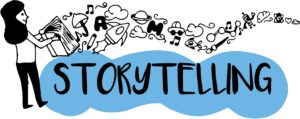Corporate Storytelling: Why Brand Needs Story
Story crosses borders, reconciling supposed opposites, and eroding false distinctions. What works in entertainment works just as well for B2C and B2B brands and communications. Think about it, people love stories! As human beings, we share stories every single day (unless we are hermits and live alone in the mountains). Gossip is a form of storytelling, and we love it because it makes us curious. Successful advertisements are often mere stories that inform and showcase something. If story is at the heart of our being, then branding requires corporate storytelling in order to succeed. It is just how it is and how it will always be!
Why Do You Need Story for Your Brand?
Think about what makes you unique in your industry. Why do you stand out? Chances are, your story is what makes your business unique. If you stop telling your story, you become unremarkable, unoriginal, and forgettable. People know about Geico not because they are an insurance company but because they are an insurance company that constantly tells stories, reminding people of its goal to give people “15% off car insurance.”
Stories speak to both parts of the human mind—its reason and emotion. This is extremely important when it comes to marketing and sales. Corporate storytelling provide a medium of communications, both internally within an organization and externally to clients, potential clients, business partners, business rivals, investors, and others.
At the heart of every good business story there lies a truth that is simple enough for the management to communicate and so recognizable that clients and others can quickly connect with it.
The Storyteller’s Role in Branding
It is important that the storyteller knows and understands his/her audience persona. With corporate storytelling, story content varies based on the audience’s (targeted buyer’s) persona.
For targeted audience considerations, it is important that we understand both the demographics (age, gender, culture, etc.) and psychographics (needs, wants, stereotypes, and emotions). The best of storytellers change their approach based on their audience.
For instance, if you are creating a business brand for a new book publishing agency that seeks female voices, then your corporate storytelling would be all about what made that company choose to go in the direction it did. The story here should speak out to female writers and call them to consider this publishing agency.
No matter what you are marketing, your story should be at the front and center. Sharing who you are and how your company came to be is your role as a storyteller, and that is what people most want to know about. Make your targeted audience believe in your goal and you would have sold them the idea of you. That is the best way to succeed in today’s world! So, when it comes to brand marketing, corporate storytelling is essential if you want to be at the top of the industry.

